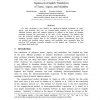Free Online Productivity Tools
i2Speak
i2Symbol
i2OCR
iTex2Img
iWeb2Print
iWeb2Shot
i2Type
iPdf2Split
iPdf2Merge
i2Bopomofo
i2Arabic
i2Style
i2Image
i2PDF
iLatex2Rtf
Sci2ools
107
click to vote
CORR
1999
Springer
1999
Springer
An Example-Based Approach to Japanese-to-English Translation of Tense Aspect, and Modality
We have developed a new method for Japanese-to-English translation of tense, aspect, and modality that uses an example-based method. In this method the similarity between input and example sentences is defined as the degree of semantic matching between the expressions at the ends of the sentences. Our method also uses the k-nearest neighbor method in order to exclude the effects of noise; for example, wrongly tagged data in the bilingual corpora. Experiments show that our method can translate tenses, aspects, and modalities more accurately than the top-level MT software currently available on the market can. Moreover, it does not require hand-craft rules.
CORR 1999 | Education | Example-based Method | Japanese-to-English Translation | K-nearest Neighbor Method |
| Added | 22 Dec 2010 |
| Updated | 22 Dec 2010 |
| Type | Journal |
| Year | 1999 |
| Where | CORR |
| Authors | Masaki Murata, Qing Ma, Kiyotaka Uchimoto, Hitoshi Isahara |
Comments (0)

